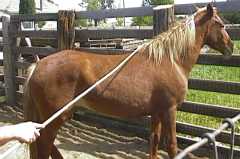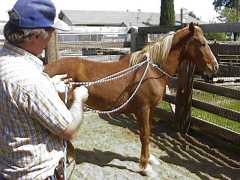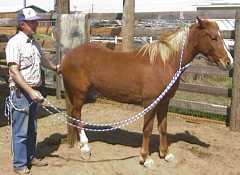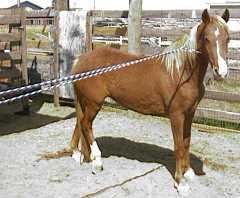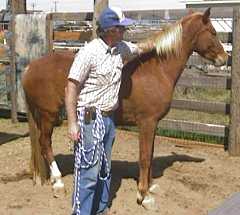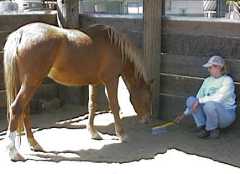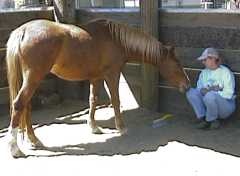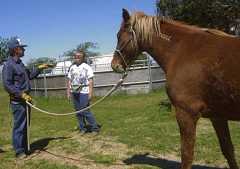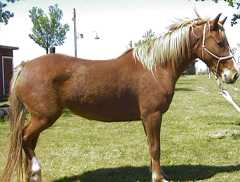KBR Horse Net
|
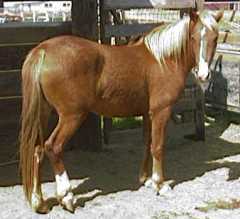
|
|
Shiloh was a rather "touch me not" mare that was adopted
as a 3 year old at the 1998 Wild Horse Workshop. She was
adopted with the group that came in at the end of the workshop,
not one which was trained.
She wasn't mean but she was difficult to get close to plus she had a knack for getting out of halters. After several months of frustration and feet which were getting longer, her owners needed a quick but humane solution and we agreed to take Shiloh and "Big Sheba," a rather stout Klamath mare in for gentling and foot trims. We only had room for one horse at the beginning so we decided to take Shiloh first as she seemed the most mild mannered. On loading day she was all mustang and we did get her loaded fairly quietly, but not before she tried to sail over her paddock fence when we attempted to shoo her out of her pen, and in doing so bending the fence and scuffing her chest. We moved her in on a Sunday morning. Shilo's owners had previously worked with her with a bamboo pole and clicker and it showed. On Sunday afternoon I decided to just go in her pen to see what she was all about. She was very defensive, but using the pole, I managed to get a sliding neck loop on her to control her movement some and in less than an hour I had brushed her from tail to ears. (I say "tail to ears" because this mare had an itchy rump. She didn't want to give me her head or shoulders, but kept backing into the brush. You go with what you have and I worked up to her head from there.) She would, however, only give me her off side at this point but she was just settling in and I didn't want to push things. Day 2: Shiloh was still adjusting to the mustang pen. Sharon worked with her a little on clicker targeting. She wasn't put under any pressure as her chest was a little swollen still from her flight attempt and she was undoubtedly sore. Day 3: It was a windy day so I decided not to try to get her into the chute. We polished up click reinforcement and I once again went all over her body. This time she finally let me approach her on her "on" side so I spent a great deal of time desensitizing her there. Day 4: It was even windier than the previous day, but Shiloh was getting used to all the noises, although she would flinch when a loud bang would come from the place next door. I set up the sliding neck loop again. We worked on touching her head and muzzle. I also rubbed her with her halter. She wasn't steady enough for me to halter in the open, so I hazed her into the gentling chute. After giving her time to get relaxed in there, I approached her in the chute and while giving click reinforcement and good back scratches, got the halter back on without much fuss. Back in the pen we worked on some basic yielding to pressure and more close contact. I was able to touch her without grabbing the drag lead, but if I took the drag lead off, she was difficult to reconnect so I left it on for the night. Day 5: When I went to feed in the morning it was windy as all get out. Shiloh had already started working on getting her halter off and it was in front of her left ear and almost covering her left eye. Back to the sliding neck loop and "quick halter" we went as I tried on just about every halter in the stable before I found one that fit. We also worked on some facial and muzzle work, using TTEAM and Frank Bell's approaches. After a couple of minutes she almost melted in my hands in spite of the constant rattling and banging in the wind. I had originally planned on worming her today, but with this big offering of trust, I didn't have the heart to do it. Day 6: It wasn't quite as windy as Thursday. Shiloh was obviously working on removing the rather close fitting halter she was wearing as she had rubbed small sores on her cheeks from the halter hardware. It was time to ditch the halter and teach her to be haltered quietly. We haltered several times with the neck loop as backup, then several times without the loop. She would still check me out when I approached but would stand like a lady to be haltered. During one quiet moment, I rubbed her muzzle and slipped her a dose of wormer without her even realizing it. (If only my domestics were that easy!) |
The first step was to get
|
|
Eventually she made it out of the pen and went into sensory overload. She lowered her head and stared for a few seconds, then bucked and trotted in place, then realized that everything was OK and followed me rather gingerly around the stable. She wasn't real happy yet with close spaces, but all in all she led quietly and didn't do anything stupid. Sharon worked with her on click targeting on the line out in the open so she could get some practice focusing on specific things while at the same time processing all the goings on in the stable. Later we led her back home for a rest and just before feeding time, Sharon went in and haltered her quietly several times. Continue to Part 2Press "Back" to return to the page that brought you hereReturn to Case Study SectionReturn to Training SectionReturn to Wild Horse MentorsReturn to KBR World of Wild Horses and BurrosGo To
| |
